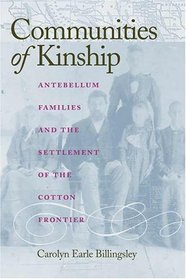Search -
Communities of Kinship: Antebellum Families and the Settlement of the Cotton Frontier
Communities of Kinship Antebellum Families and the Settlement of the Cotton Frontier
Author:
Trained as both a genealogist and a historian, Carolyn Earle Billingsley shows how the analytic category of kinship can add new dimensions to our understanding of the American South. In Communities of Kinship, she studies a southern family?-that of Thomas Keesee Sr.?-to show how the biological, legal, and fictive kinship ties between him and som... more »
Author:
Trained as both a genealogist and a historian, Carolyn Earle Billingsley shows how the analytic category of kinship can add new dimensions to our understanding of the American South. In Communities of Kinship, she studies a southern family?-that of Thomas Keesee Sr.?-to show how the biological, legal, and fictive kinship ties between him and som... more »
ISBN-13: 9780820325095
ISBN-10: 0820325090
Pages: 215
Rating: ?
ISBN-10: 0820325090
Pages: 215
Rating: ?
0 stars, based on 0 rating
Publisher: University of Georgia Press
Book Type: Hardcover
Other Versions: Paperback
Members Wishing: 1
Reviews: Amazon | Write a Review
Book Type: Hardcover
Other Versions: Paperback
Members Wishing: 1
Reviews: Amazon | Write a Review
Genres:
- History >> Americas >> United States >> 19th Century >> Antebellum
- History >> Americas >> United States >> 19th Century >> General
- History >> Americas >> United States >> General
- History >> Historical Study & Educational Resources >> Social History
- Parenting & Relationships >> Family Relationships
- Nonfiction >> Social Sciences >> Anthropology >> General
- Nonfiction >> Social Sciences >> General




